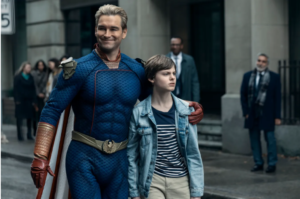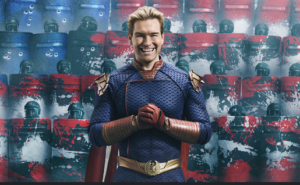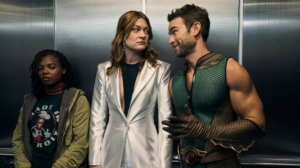A Hero’s Trial For The Boys Season 4
In the grand nation of the United States — within the satirical universe of The Boys, where humans and superheroes coexist — the paramount “super,” Homelander, finds himself on trial. In the three-episode premiere of season four, Homelander, portrayed by Antony Starr, faces a jury of twelve for committing an egregious public crime, echoing the boastful claims of a former president in our reality. However, boasting proves advantageous when jurors are mere mortals, susceptible to Homelander’s lethal powers. Predictably, Homelander is acquitted. This season, as creator Eric Kripke elucidates, mirrors the political turbulence of contemporary U.S. politics even more closely than prior seasons. “We write about our fears and frustrations,” Kripke notes, alluding to the show’s overt commentary on Trumpism. “Subtlety is not our forte.”
Post-Verdict: Homelander’s Struggles and Recruitment
Having been exonerated, Homelander grapples with fatherhood and the ineptitude of the remaining members of the Seven, Voight International’s elite supe squad. Currently, only four members remain: The Deep (Chace Crawford), the new Black Noir (Nathan Mitchell), A-Train (Jessie T. Usher), and Homelander himself. He seeks three new recruits, one of whom will be his son, Ryan (Cameron Crovetti). Additionally, he faces a vacancy left by Starlight, aka Annie (Erin Moriarty), who has spearheaded an anti-Voight, anti-Homelander movement named the Starlighters. In a vengeful move, Homelander invites his most fervent fans to a private event, has them killed by the Seven, and frames the Starlighters for the deaths.
Homelander’s initial choice for a new recruit is Sister Sage (Susan Heyward), a young Black woman from Detroit whose superpower is unparalleled intelligence. This selection may seem incongruous given Homelander’s perceived supremacist tendencies, but as Kripke explains, Homelander is more of a supe supremacist than a racial one. “He values power above all,” Kripke says. “Imbeciles surround him and recognizes the necessity of intelligence, even if it challenges his ego.”
The Boys’ Personal Turmoil
In the second and third episodes, the Boys confront their personal demons. Hughie (Jack Quaid) neglects his ailing father, who ends up on life support. Frenchie (Tomer Capone) falls for a member of Starlight’s organization who may uncover his dark past. Kimiko (Karen Fukuhara) recklessly avoids acknowledging her jealousy over Frenchie’s new relationship. Meanwhile, Butcher (Karl Urban) remains a thorn in everyone’s side as he attempts to make amends before the Temp-V drug from season three terminates his life.
Episode two introduces Firecracker (Valorie Curry), a character embodying political figures like Marjorie Taylor Greene and Lauren Boebert. Sister Sage ironically ushers in this dim-witted and racist member of the Seven. Kripke likens Firecracker to controversial politicians, noting her alignment with extremist ideologies.
A Rollercoaster Ride of Satire and Chaos
The Boys continues its unbridled satire with the new season, delivering gut-wrenching humor and unpredictable twists. Kripke promises an escalation of craziness, hinting at “bananas” moments in every episode, particularly episode six, which he describes as jaw-dropping. “Expect the unexpected,” Kripke grins, alluding to wild scenarios like Temp V-ed up farm animals and Batman parodies with Tek Knight (Derek Wilson).
Despite The Boys concluding after its fifth season, its universe will persist through spinoffs like Gen V and the animated anthology Diabolical. Kripke acknowledges Amazon’s support, providing the creative liberty to expand the franchise.
New episodes of season four stream Thursdays on Prime Video. For further insights, delve into Kripke’s detailed interviews and revisit the enthralling third season.
where to watch :
also checkout : https://hollywoodandentertainment.com/bridgerton-season-3-part-2/#more-308


